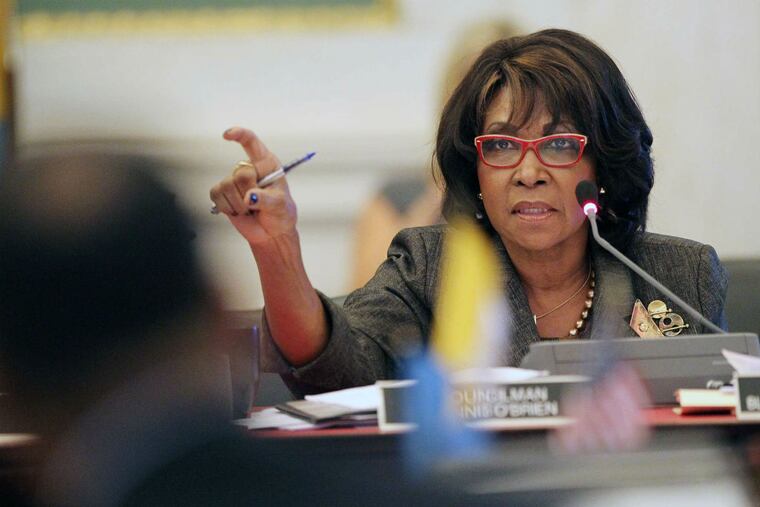Reynolds Brown to propose container tax as alternative
City Councilwoman Blondell Reynolds Brown on Thursday plans to introduce a tax on beverage containers as an alternative to Mayor Kenney's proposed tax on sugary drinks.

City Councilwoman Blondell Reynolds Brown on Thursday plans to introduce a tax on beverage containers as an alternative to Mayor Kenney's proposed tax on sugary drinks.
Containers would be taxed at a rate of 15 cents each, a source familiar with Reynolds Brown's proposal said.
The councilwoman's office on Wednesday confirmed that she would introduce the "container tax," which has been levied elsewhere on products ranging from beer to bottled water. It did not say what rate she was seeking, or provide a list of products that would be affected, but said the tax would bring in at least $64 million annually.
"If the goal is to provide a sustainable proposal that will allow for universal pre-K for all, improvements and access to recreation centers for all, and community schools for all, the tax should impact all - from soda to Perrier," Reynolds Brown said in a statement Wednesday.
A container tax would likely affect far more products than Kenney's proposal, but bring in less revenue per item. Kenney is seeking a 3-cents-per-ounce tax on sugary beverages, a levy he says would reap $400 million over five years.
His office on Wednesday said a container tax would not generate enough revenue.
Reynolds Brown had floated the possibility of a container tax in budget hearings last week, asking members of Kenney's administration if they had considered a tax "similar to the one implemented in Baltimore."
Baltimore's tax, which was instituted in 2010 at 2 cents per container and raised in 2012 to 5 cents, is levied at the distribution level on beer, malt beverages, distilled spirits, wine, wine coolers, ready-to-drink teas, carbonated water, spring water, and soft drinks.
Bottles of two liters or larger are exempt, as are dairy products and beverages containing at least 10 percent natural fruit juice.
Councilwoman Maria Quiñones-Sánchez, who opposes Kenney's plan to tax sugary drinks, on Wednesday said she would support a container tax.
Others, though, pushed back on the proposal before it could be officially revealed.
"We are opposed to any regressive tax that unfairly singles out one set of products and negatively impacts those who consume them," said Larry Miller, spokesman for the No Philly Grocery Tax coalition, which is funded largely by the American Beverage Association.
Kevin Feeley, spokesman for Philadelphians for a Fair Future - which supports Kenney's proposal - said a container tax has the "illusion of fairness," but would hurt poor people more than a sugary-drinks tax because it can't be avoided.
Kenney spokeswoman Lauren Hitt on Wednesday said a container tax would bring in "tens of millions of dollars" less than is needed to fund the mayor's initiatives - universal pre-kindergarten, improvements to parks and recreation centers, and the creation of community schools.
"Thousands of children's futures are determined by their zip code because our educational system provides them no real path to success," Hitt said in an email. "All this alternative would do is nibble around the edges of that problem. We need to change the status quo."
The alternative to Kenney's plan surfaced on a day ripe with smaller developments in the ongoing saga.
In a carefully phrased, 500-word statement, the Greater Philadelphia Chamber of Commerce weighed in on the tax - sort of - without mentioning it by name. The group said "ideally taxes should be broad-based and not target a particular industry," while adding it supported Kenney's "far-reaching proposal."
Joe Grace, Vice President of State and Local Advocacy for the chamber, said the statement was meant to underscore support for Kenney's initiatives, but he added that ultimately, "City Council is going to have to make the decision on revenue."
Also Wednesday, Action United, an advocacy group that supports the drink tax, challenged Quiñones- Sánchez to commit to not taking campaign contributions from the soda industry. She accepted $8,400 from the industry in 2014 and 2015, according to campaign finance reports.
"I'm not going to step away from the fact that I have a relationship with Coca-Cola," said Quiñones-Sánchez, who has a bottling plant in her district. "I have 435 jobs here. A lot of the folks that work there live in my community of Juniata. And they feel just as passionate as you about my coming to their defense."
Most members of Council as well as Kenney have accepted campaign contributions from the soda industry. Members of Action United said they targeted Quiñones-Sánchez because she has stated her opposition to the sugary-drink tax.
215-854-2730
@TriciaNadolny
Staff writer Julia Terruso contributed to this article.